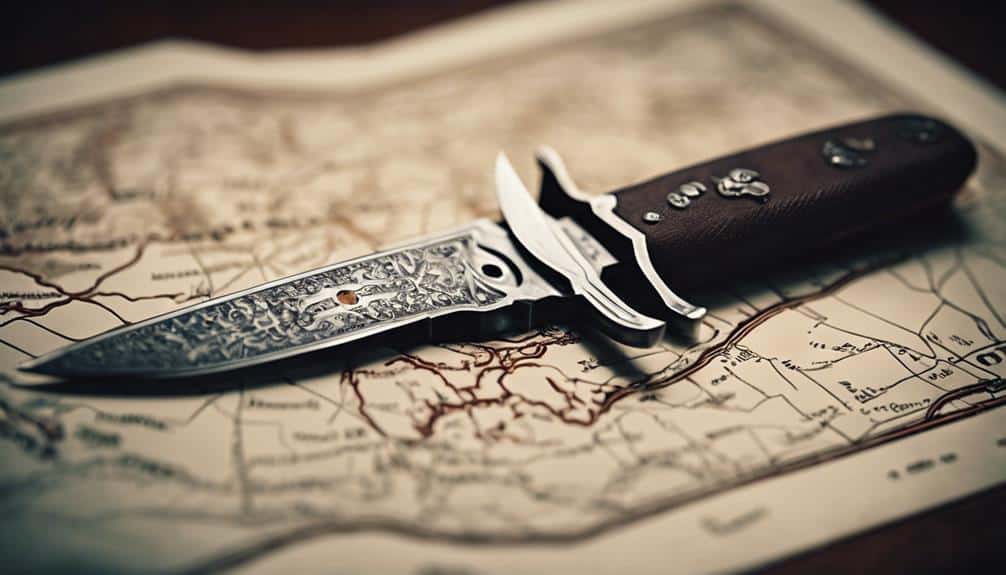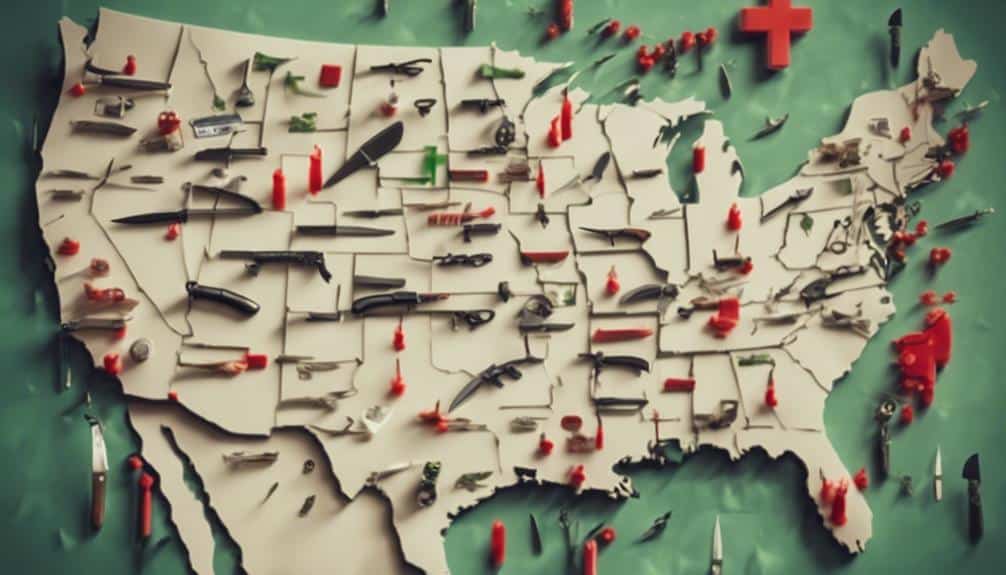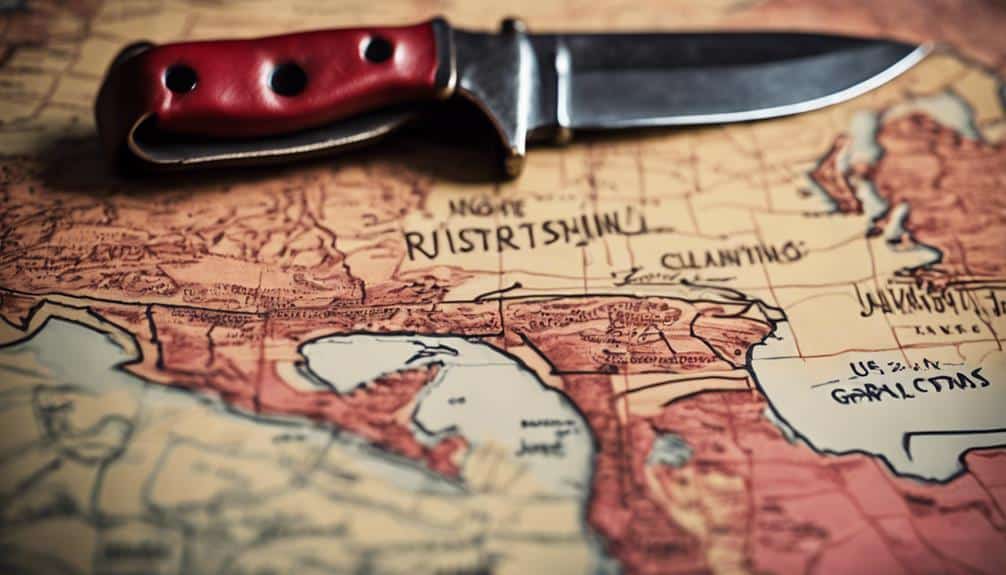You might think owning an
out-the-front (OTF) knife is straightforward, but the
legal landscape is anything but simple. While some states like Texas allow you to carry these knives without issue, others, such as New York, have
strict bans that could land you in legal trouble. Even states like California have specific
blade length restrictions you need to know about. So, what are the actual laws in your state, and how can you guarantee you’re compliant? Let’s explore the intricate details that can make all the difference in your everyday carry choices.
Understanding OTF Knives
OTF knives, short for
Out-the-Front knives, set themselves apart by deploying the
blade straight out from the front of the handle, unlike traditional switchblades that open from the side. Imagine James Bond flicking one open with a swift push of a button—that’s the allure of
OTF knives. They come in two flavors:
double action, letting you extend and retract the blade automatically, and
single action, where you’ll need to manually retract the blade after deployment.
When it comes to
state laws regarding these automatic knives, the landscape can be as varied as the knives themselves. Some states welcome them with open arms, making them legal to carry, while others have strict regulations or outright bans. Think of it as the wild west of knife laws—one state’s treasure is another’s contraband. The
Switchblade Knife Act governs the interstate sale and transport of OTF knives but doesn’t touch on ownership or carrying within state lines.
Understanding your local laws is key. For instance, one state might restrict blade lengths or specific locations where you can carry them, making it a bit like maneuvering through a
legal minefield. So, always check before you flick!
Federal Laws on OTF Knives
When it comes to federal laws on OTF knives, you’ve got to navigate a few key restrictions. The
Switchblade Knife Act of 1958 primarily targets
automatic knives, making it illegal to manufacture, transport, or sell them across state lines, but surprisingly, it doesn’t regulate possession or carrying at the federal level. Law enforcement officers enjoy certain exemptions, allowing them to carry these blades, while the rest of us must rely on
state laws to determine our OTF knife rights.
Federal Restrictions Overview
The regulation of out-the-front (OTF) knives at the federal level centers on the
Switchblade Knife Act (FSA) of 1958. This
federal law specifically targets automatic knives, including your trusty OTF knives, by prohibiting their manufacture,
transport, and sale across state lines. If you’re thinking about driving your prized OTF knife across the country, think again—interstate transport is a no-go under the Switchblade
Knife Act.
Interestingly, the FSA doesn’t touch on
possession or carrying. That’s right, federal law leaves those aspects up to the states, making it a bit of a legal patchwork. Plus, while you might worry about
blade length laws, rest easy knowing that federal regulations don’t impose blade length restrictions on OTF knives—that’s again up to each state.
Here’s a quirky twist: under 18 U.S. Code 1716, OTF knives are
nonmailable. So, don’t try sending one through the mail unless it’s for
military or municipal purposes; otherwise, you’re in for a
legal headache. Remember, the FSA’s main focus is on sale and interstate transport, leaving states to establish their own rules on ownership and carrying. Happy law-abiding slicing!
Interstate Trade Regulations
While the
federal government leaves possession and carrying of
OTF knives to the states, it takes a firm stance on
interstate trade. The
Switchblade Knife Act (FSA) of 1958 is the key player here. This federal law regulates automatic knives, including OTF knives, and prohibits their manufacture, transport, and sale across state lines. So, if you’re thinking of sending one as a gift to your cousin in another state, you might want to reconsider.
Under 18 U.S. Code 1716, switchblades are classified as
nonmailable items. This means:
- You can’t send them through the U.S. Postal Service.
- There are specific, limited circumstances where mailing might be allowed.
- Manufacturers and sellers face the most restrictions.
- Individual consumers aren’t as impacted, provided they follow state laws.
Federal regulations focus primarily on interstate trade and sales, leaving state laws to dictate whether you can carry any knife, including OTF knives, within your state. So, while you might be able to own an OTF knife legally in your state, crossing state lines with it or engaging in interstate transactions could land you in hot water. Always check both federal regulations and your local state laws to stay on the right side of the law.
Law Enforcement Exemptions
Many federal laws place strict restrictions on
OTF knives, but exemptions exist for
law enforcement officers. Under federal law, cops can carry and use OTF knives, including switchblades, without the same legal restrictions that apply to civilians. Thanks to the
Switchblade Knife Act of 1958, law enforcement agencies have the green light to utilize these automatic knives for
operational purposes, bypassing the red tape civilians face.
That said, exemptions for law enforcement can vary by
state. Some states have specific provisions clarifying the legal status of OTF knives for police use, allowing officers to carry these tools regardless of
blade length restrictions that might apply to the general public. It’s like having a backstage pass to the concert of knife laws!
Training and
departmental policies often dictate how and when law enforcement can use OTF knives. These policies emphasize the operational necessity of these knives while ensuring officers adhere to
legal frameworks. So, while you might be eyeing that sleek switchblade in the store, know that your local officer might already have one, authorized and ready for use, thanks to their special exemptions.
State Law Variations
Steering through the legality of OTF (Out-The-Front) knives demands attention to state-specific regulations, which vary widely across the United States. While OTF knives might be federally legal, each state has its own unique set of rules regarding their definition, possession, sale, and carry.
For instance, in California, OTF knives are classified as switchblades, making it illegal to carry them unless the blade is under 2 inches. On the flip side, Texas embraces OTF knives with open arms, imposing no specific restrictions on possession or carry. Then there’s New York, where broad restrictions fundamentally prohibit civilian ownership of these intriguing tools.
States like Florida and Arizona are more lenient, allowing you to own and openly carry OTF knives, although concealed carry might require a permit. It’s vital to be aware of:
- California: Illegal to carry if blade > 2 inches.
- Texas: No restrictions on possession or carry.
- New York: Broad restrictions on civilian ownership.
- Florida and Arizona: Legal to own and open carry; permits may be needed for concealed carry.
Navigating these laws can feel like tiptoeing through a knife-edge maze, but staying informed guarantees you don’t end up on the sharp side of legal penalties.
States With No Restrictions
After examining the patchwork of regulations in various states, it’s invigorating to explore regions where OTF knives face no restrictions. If you live in Texas,
Florida,
Arizona,
Utah, or Nevada, you’re in luck. These states have no prohibitions against the possession,
sale, or carry of OTF knives for non-law enforcement citizens. You can freely purchase, carry, and use these automatic knives without needing any special permits or worrying about legal repercussions.
Imagine strolling through a Texan market, picking out an OTF knife that catches your eye, and knowing you’re completely within your rights. It’s a welcome change compared to states with stringent rules. While some general laws regarding blade length might exist, they still allow for unrestricted ownership, offering you both freedom and flexibility.
The permissive legal environment in these states stands in stark contrast to those with strict regulations on automatic knives. However, always stay aware of local laws, as certain municipalities might have their own restrictions even in otherwise permissive states. So, while you’re enjoying your newfound freedom, remember to check local ordinances to avoid any unexpected surprises. Happy knife shopping!
States With Partial Restrictions
Maneuvering the legal landscape of OTF knives can be tricky, especially in states with partial restrictions. Understanding where, how, and when you can carry or possess these knives is vital to avoid legal pitfalls. In some states, OTF knives fall into a gray area, making it essential to know specific knife laws to stay compliant.
For instance, in California, OTF knives are considered switchblades and are illegal to carry if the blade exceeds 2 inches. Meanwhile, New York has broad restrictions on OTF knives, prohibiting possession, sale, and carry for anyone who’s not a law enforcement officer. If you’re in New Jersey, be cautious because OTF knives there are classified as illegal weapons, leading to severe penalties for possession.
Here’s a quick rundown of states with partial restrictions:
- California: Legal if the blade is under 2 inches.
- New York: Broad restrictions, illegal for non-law enforcement.
- New Jersey: Classified as illegal weapons, harsh penalties.
- Florida: Ownership allowed; concealed carry requires a CCW permit.
Understanding these laws helps you navigate the complexities of possession of a switchblade. Always double-check local regulations, as knife laws can vary widely and change frequently. Stay informed, stay safe, and keep your blades legal!
States With Complete Bans
In states like California and New York, you’ll find
complete bans on OTF knives for anyone who’s not in law enforcement, and the penalties can be pretty harsh. New Jersey doesn’t mess around either, classifying these knives as
illegal weapons with strict consequences if you’re caught. Meanwhile, Washington D.C. takes it a step further with a
total prohibition on switchblades, including OTF knives, so don’t even think about it unless you want to face severe legal trouble.
Absolute Prohibition Areas
Although the legal landscape for OTF knives varies widely across the United States, some areas maintain absolute prohibitions on these weapons. These strict laws make it completely illegal to possess, sell, or carry switchblades or automatic knives, ensuring that you won’t find these handy tools in certain states. The District of Columbia, for instance, enforces stringent regulations that classify switchblades as dangerous weapons, making their possession a serious offense.
Here are some states with complete bans:
- New York: Prohibits the possession of switchblades and OTF knives for civilians, with specific exceptions for law enforcement personnel.
- New Jersey: Classifies automatic knives, including OTF knives, as illegal weapons, imposing harsh penalties for possession and sale.
- California: Considers OTF knives as switchblades and restricts their carry unless the blade length is under 2 inches. So, unless you’re into micro-blades, you’re out of luck!
- Massachusetts: Heavily restricts the possession and sale of automatic knives, making them illegal for civilian use.
Navigating these laws can feel like walking through a legal minefield, but understanding where these absolute prohibitions exist is essential. If you’re planning a trip or considering a move, it’s wise to check local regulations first—better safe than sorry!
Specific Penalty Details
Understanding where
absolute prohibitions exist is just the first step; knowing the
specific penalties can make all the difference if you find yourself in a tricky situation. In
California, while possession of
OTF knives is legal, carrying them, unless the blade is under 2 inches, is a no-go. Violations here result in
misdemeanor charges—so keep that blade short if you must have one!
In
New York, OTF knives are classified as switchblades, and knives are illegal for anyone who isn’t law enforcement. Get caught, and you could be looking at fines or even some quality time behind bars. Over in New Jersey, any automatic knives, including OTFs, are considered
illegal weapons. If you’re caught with one, you’re facing serious penalties, including potential prison sentences. Yikes!
Meanwhile, Massachusetts doesn’t mess around either—possession of automatic knives or OTF knives is illegal, with violations leading to fines and criminal charges. And if you thought Washington,
D.C. might be more lenient, think again. All switchblades and OTF knives are banned there, too, with hefty fines and potential imprisonment for possession.
Legal Myths About OTF Knives
Dispelling common myths about OTF knives helps clarify their legal status. Many people believe that OTF knives are universally illegal, but this isn’t true. Understanding the laws and regulations surrounding these knives, especially at the Federal level, reveals a more nuanced picture.
Federal law doesn’t outright ban the possession or carrying of OTF knives; it mainly regulates their manufacture and interstate sale. This means owning an OTF knife isn’t inherently illegal under Federal law. However, state-specific laws and regulations vary, creating widespread legal myths. For instance, some states, like Vermont and Utah, have no restrictions, allowing you to purchase and carry these knives freely.
Here are some common legal myths about OTF knives:
- OTF knives are illegal everywhere.
- All switchblade knives, including OTFs, are banned by Federal law.
- You can’t legally carry an OTF knife in any state.
- States have uniform laws regarding blade length restrictions.
Misunderstandings often arise because OTF knives are classified as switchblade knives, and their legality can hinge on state definitions. To navigate these regulations effectively, you need to debunk these myths and understand the specific laws in your state.
Importance of Knowing Local Laws
Having debunked the myths surrounding OTF knives, it’s clear that knowing your local laws is vital. OTF knives, or out-the-front knives, have a complex legal landscape across the United States. While states like Texas and Florida embrace them with open arms, states such as California and New York can make you feel like a fugitive for carrying one. Knowing your local laws isn’t just smart—it’s essential.
Imagine you’ve just bought a sleek OTF knife, and you’re ready to show it off. But wait! Have you checked your state’s regulations? In California and New York, these knives are illegal to possess for civilians. On the other hand, Texas and Florida have no such qualms. If you’re in Connecticut, you’ll need to measure that blade because there are strict length restrictions.
| State |
Regulation Status |
| California |
Illegal to possess |
| New York |
Illegal to possess |
| Texas |
No restrictions |
| Florida |
No restrictions |
| Connecticut |
Blade length restrictions apply |
Failing to do your homework can lead to fines or even criminal charges. Local laws can change frequently, so staying informed means you’ll enjoy your knife responsibly and legally. So, before you get too attached to that OTF knife, make sure you’re not breaking any laws!
Frequently Asked Questions
In What States Is It Legal to Own an OTF Knife?
When wielding the right to self-defense, OTF knife regulations vary. In states like Texas, Florida, and Arizona, you’re free to own and use OTF knives. Knife collector laws in these regions honor your knife ownership rights.
What States Are OTF Knives Legal in 2024?
In 2024, check OTF knife regulations in each state. State knife laws vary widely. Knife ownership rights differ, especially for self-defense tools and outdoor gear legality. Some states permit OTF knives, but restrictions apply in others.
Does an OTF Count as a Switchblade?
Think of an OTF knife as a
double-edged sword. Yes, it often counts as a switchblade due to its mechanisms. Legal definitions vary, affecting knife ownership rights. They’re seen as self-defense tools or collector’s items in different contexts.
In What States Are Butterfly Knives Illegal?
You need to be aware of butterfly knife laws. In states like California, New York, and New Jersey, butterfly knives are illegal. Ignoring state regulations can lead to serious legal consequences and impact your knife ownership rights.









One Response